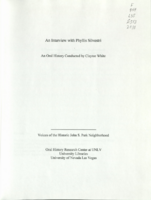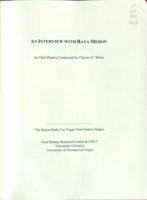Search the Special Collections and Archives Portal
Search Results

Transcript of interview with Irene Fisher and Roberta Gang by Barbara Tabach, September 29, 2016
Date
Archival Collection
Description
Las Vegas has been home to Irene Fisher (1940 - ) since the early 1970s. It felt like home as she connected with the Jewish community, including a dear friendship with Roberta ‘Bobbie’ Gang, who sits with her during this interview. During their oral history conversation, the seemingly common concerns of any mother are touched upon. In their case they were young Jewish women looking out for the well-being of their children. They cover a range of topics, from b’nai mitzvahs to Hanukkah to shopping in those years of raising children, being active in the community, and maintaining career paths. Irene begins by describing her ancestral background that includes parents who emigrated from Poland to New York. In New York she met and married a young doctor who she followed to Nellis Air Force Base. Irene was a recent graduate of Brooklyn Law School. In Las Vegas, though Irene did not practice law here, she immersed herself into civic contributions. Chief among those was with the Clark County
Text

Mary Carol Melton interview, March 5, 1981: transcript
Date
Archival Collection
Description
On March 5, 1981, collector Kathy Ricks interviewed Mary Carol Melton (b. April 4th, 1900 in Rockville, Missouri) about her life in Nevada and the development of the United Methodist Church in Las Vegas. Melton speaks about moving to Las Vegas, Nevada because of her husband’s health, her time working with attorney offices and in the Las Vegas Courthouse, and the different homes in which her family lived. Moreover, Melton talks extensively about starting the first Sunday school in North Las Vegas in a garage as well as the church she and her husband built. Melton discusses the programs and minstrels performed in the church, the crafts sold to make money for the church and the organ they purchased. Lastly, Melton talks about going to the Hoover Dam nearly every week to see new developments, her participation in the Daughters of the American Revolution (DAR), and watching the above ground atomic tests.
Text

Nanyu Tomiyasu interview, April 12, 1977: transcript
Date
Archival Collection
Description
On April 12, 1977, collector Mark French interviewed Nanyu Tomiyasu (born May 28th, 1918 in Las Vegas, Nevada) at the University of Nevada, Las Vegas. In this interview, Nanyu Tomiyasu discusses growing up and working on his father’s (Bill Yonema Tomiyasu) farm in Las Vegas, Nevada. He also discusses how his father came to Las Vegas and being one of the few Japanese families in Las Vegas as a child.
Text

Transcript of interview with Byron Underhill by Joyce Moore, March 20, 2002
Date
Archival Collection
Description
Byron Underhill's father owned the first Coca-Cola bottling plant, the first beer distributorship, and the first bowling alley in Las Vegas. Byron moved here from Needles, Calif., with his family in 1927. Byron later took over the bottling plant, served in the Army as an aircraft mechanic and a glider pilot during World War II, was a private pilot who worked with Search and Rescue, played in various bands, and suggested to the Lions club that they found a burn unit at University Medical Center that is still the only one in the state
Text

Mike Montano interview, September 19, 2008: transcript
Date
Archival Collection
Description
First played in Las Vegas with Jack E. Leonard in 1960. Only worked at two hotels during his 24-year Las Vegas career - Flamingo and riviera
Text

Transcript of interview with Dorothy George by Claytee White, October 13, 2003
Date
Archival Collection
Description
After serving as a nurse in World War II in Hawaii, Okinawa and Japan, Dorothy returned home to Chippewa Falls, Wisconsin. She experienced a particularly bad winter and she set out for California but stopped in Las Vegas to visit the family of her traveling companion, a girlfriend from her home town. The girlfriend returned to Wisconsin and George applied for a nursing license and got it within three days. She never left. Dorothy met her husband while working the night shift at Clark County Hospital. He would come in regularly to assist his patients in the births of their babies. Their occupations and their service in World War II drew them together in a marriage that has lasted over fifty years. From 1949 to this interview in 2003, Dorothy George has seen Las Vegas grow from a town that she loved to a metropolitan area that is no longer as friendly. She reminisces about the Heldorado parades, family picnics at Mount Charleston, watching the cloud formed by the atomic bomb tests, raising six successful children, leading a Girl Scout Troop, and working in organizations to improve the social and civic life of Las Vegas.
Text

Transcript of interview with Joshua Abbey by Barbara Tabach, June 6, 2016
Date
Archival Collection
Description
Joshua Nathaniel Abbey was born in 1956 to artist Rita Deanin Abbey and author Edward Abbey. While much of Joshua?s early childhood was spent in the southwest following his father?s job, Hoboken, New Jersey, was where he attended elementary school and where his Jewish foundation took shape with his maternal grandparents. In 1964, the Abbey family moved westward again to Las Vegas. Though his father moved on and became a distant influence on Joshua?s life, his mother, Rita, remained and became an artist and art instructor at UNLV. Upon graduating from Las Vegas? Valley High School, Joshua set his sights on an acting career. His creative and industrious energies would inspire him to move about: from Los Angeles to New York and back to Las Vegas. He traveled the world, met the love of his life Yve Eiholzer-Abbey, a fellow Thespian. Eventually the couple made Las Vegas their permanent residence. In this interview, Josh recalls his life?s journey and the many career steps, friendships and accomplishments he has experienced along the path. Among Josh?s local contributions is the creation the Las Vegas Jewish Film Festival, which began in 2001. He also was founder of CineVegas Film Festival in 1998; a member of the Nevada Arts Council, City of Las Vegas Arts Commission and Director of the Desert Space Foundation, a local non-profit foundation committed to assisting emerging arts groups. He has also worked with Blue Man Group, for Jewish Family Service Agency, had a brief speaking part in the movie, The Natural, and been an activist opposing the Yucca Mountain waste repository-and much more. Joshua is a graduate of University of Nevada Las Vegas (Theater Arts 1980) and American Film Institute (1993).
Text

Transcript of interview with Guy Hamblin by Barry Merrell, February 22, 1975
Date
Archival Collection
Description
On February 22, 1975, Barry Merrell interviewed former railroad worker Guy Hamblin (born 1896 in Clover Valley, Nevada) in his home at 4306 Kay Place, Las Vegas, Nevada about the history of Southern Nevada. Specifically, the two discuss Hamblin moving from different towns in Nevada before settling down in Southern Nevada, viewing the above-ground atomic bomb tests, early Fremont Street, and his work on the railroad. In addition, Hamblin also discusses the demographic and economic changes that he has seen in Las Vegas.
Text

Transcript of interview with Phyllis Silvestri by Claytee White, January 11, 2010
Date
Archival Collection
Description
As a young woman, Phyllis Silvestri made the adventurous decision to move to the United States. She was bom in Canada and lived there until her early 20s. Over the next few years, Phyllis and her friend Mona logged many miles, worked and visited several states. By 1953, Phyllis had met and married Vincent Silvestri, who worked at Bingo Palace, now the Sahara Hotel and Casino. Soon they had their first child and had bought a home on Santa Rosa. A few years later they were building a new home in the John S. Park area. She proudly recalls her husband's attention to details such as including lots of built-in features and a bomb shelter that represents the era. Phyllis talks fondly of the neighborhood, but also recalls her children not being allowed to play with some of the neighborhood children because they were of Italian ancestry.
Text

Transcript of interview with Raya Meron by Claytee White, July 14, 2014
Date
Archival Collection
Description
Raya was born in Tel-Aviv, Israel on July 8, 1935 to Edith and Gerhard Munzner. Her Mother was the daughter of Elsa and David Flachs from Berlin, Germany and her father was the son of Rachel and Zvi Munzner from Mannheim, Germany. Raya's father was jailed in 1931 as a 23 year old attorney, for being "out of the ordinary intelligent, and, therefore, highly dangerous," he was accused of being a communist because he defended social welfare cases. On the day of his release, he fled Germany, crossing the border overnight into Czechoslovakia and onward to Paris to reunite with his then fiancee (Raya's mother) and await immigration papers to the then Palestine, today's Israel. Raya's parents married upon their arrival in Jerusalem and settled in Tel Aviv in 1933. Raya's father obtained his doctorate in Economics and Law at the University of Heidelberg, Germany. Upon arrival in Israel, he got a job counting the out-of-circulation money in the basement of "Bank Yaffet" in Tel Aviv an
Text
